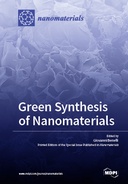Explore

Green Synthesis of Nanomaterials
Giovanni Benelli
2019
0 Ungluers have
Faved this Work
Login to Fave
Nanomaterials possess astonishing physical and chemical properties. They play a key role in the development of novel and effective drugs, catalysts, sensors, and pesticides, to cite just a few examples. Notably, the synthesis of nanomaterials is usually achieved with chemical and physical methods needing the use of extremely toxic chemicals or high-energy inputs. To move towards more eco-friendly processes, researchers have recently focused on so-called “green synthesis”, where microbial, animal-, and plant-borne compounds can be used as cheap reducing and stabilizing agents to fabricate nanomaterials. Green synthesis routes are cheap, environmentally sustainable, and can lead to the fabrication of nano-objects with controlled sizes and shapes—two key features determining their bioactivity.
This book is included in DOAB.
Why read this book? Have your say.
You must be logged in to comment.
Rights Information
Are you the author or publisher of this work? If so, you can claim it as yours by registering as an Unglue.it rights holder.Downloads
This work has been downloaded 506 times via unglue.it ebook links.
- 47 - pdf (CC BY-NC-ND) at Unglue.it.
Keywords
- Agricultural pests
- anti-fungal
- antimicrobial
- Biocatalysis
- Cacao
- carbon spheres
- cell proliferation
- chitosan
- crystallographic phase control
- CuInS2
- CVD process
- Dengue
- Desulfovibrio desulfuricans
- electrical conductivity
- energy density
- enzyme immobilization
- Escherichia coli
- filariasis
- functionalization
- graphene oxide
- green synthesis
- gum kondagogu
- hollow carbon spheres
- hyaluronic acid
- hybrid nanoflowers
- in vitro testing
- insecticides
- ionic nanocomplexes
- larvicidal
- larvicides
- leaf
- lipase
- magnetic nanomaterials
- mesoporous materials
- methylene blue
- microwave energy
- microwave injured cells
- mosquito control
- n/a
- nanomaterials (NMs)
- nanostructured
- NaYF4 mesocrystals
- non-cytotoxic
- ovicidal
- palladium nanoparticles
- photocatalysis
- Plasma
- poly-L-lactic acid
- polyarginine
- polyol-assisted fluoride ions slow-release strategy
- Raman spectroscopy
- reduced graphene oxide
- sample preparation
- Scadoxus multiflorus
- self-assembly
- silver nanoparticles
- solid carbon spheres
- solvothermal synthesis
- Sponges
- stored product insects
- synthetic amorphous silica (SAS)
- TEM
- thema EDItEUR::P Mathematics and Science::PS Biology, life sciences
- time dependence
- titanium dioxide nanoparticles
- ultrasonic dispersing (USD)
- X-ray photoelectron spectroscopy
- ZnO NPs
Links
DOI: 10.3390/books978-3-03921-787-8Editions


